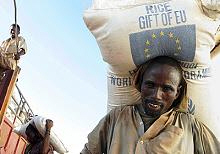
Typical street scene in Santa Ana, El Salvador. (Photo: iStock)
IMF Survey: IMF Sets Agenda to Modernize
June 7, 2007
- Six-month program prioritizes IMF's work
- Focus on major issues vital to global economy
- Surveillance, low-income countries important items in "challenging" agenda
Modernizing the IMF's economic oversight and better defining its role in low-income countries are among priorities for the Fund during the next six months.

Unloading food in Somalia: IMF work program includes study of IMF's role in managing aid flows (photo: De Malglaive Etienne/Gamma)
IMF BOARD'S WORK PROGRAM
The IMF's Executive Board discussed the work program for the institution through November 2007 that was set out by Managing Director Rodrigo de Rato.
As well as highlighting issues vital to the global economy, the new work program also focuses on the internal workings of the IMF, such as bringing member countries' voting shares in line with their current weight in the world economy and developing a sustainable model for financing the IMF.
De Rato told the Board "We face a challenging work program requiring careful prioritization and sequencing." To carry it out effectively, he said, the Board should give priority to the most pressing issues, while recognizing that the IMF's Medium-Term Strategy (MTS) targets a substantial number of areas for progress.
In 2004 de Rato launched a strategic review of IMF operations to consider how to best ensure that the institution meets the needs of its members in the 21st century. "We must build in particular on those elements of the MTS on which discussions are most advanced."
Safeguarding economic stability
Economic oversight, or surveillance, is the IMF's core responsibility and has become increasingly important in today's global economy. One of the main changes to the IMF's work proposed under the MTS, and a central feature of the new work program, is a stronger framework for surveillance: doing more to identify and promote effective responses to threats to economic stability.
In this regard, a priority in the coming months will be to update a 1977 Decision on Surveillance over Exchange Rate Policies that was drafted after the breakdown of the fixed exchange rate system in the early 1970s. Other work in this area will include a follow-up on the recent external evaluation of IMF exchange rate policy advice (see box) and a review of the IMF's first multilateral consultation on global imbalances—which involved talks with China, the euro area, Japan, Saudi Arabia, and the United States.
Evaluation follow-up
The IMF's new work program includes follow-up and discussion of two recent evaluations of IMF activity—in the areas of exchange rate policy advice, and in aid to sub-Saharan Africa—by the Independent Evaluation Office (IEO), the unit set up at arm's length from the Fund in 2001 to conduct objective assessments of IMF performance.
On May 17, 2007, the IEO released its evaluation of IMF exchange rate policy advice between 1999 and 2005. The report called for "a major refocus of efforts" to remedy what it referred to as an "effectiveness gap" in the Fund's advice on exchange rate policy. The IEO acknowledged that the quality of the Fund's advice to its member countries had improved over the seven years of the study, citing "many examples of good analysis and dedicated staff teams." But in too many cases, the report went on to say, "there was a lack of effective engagement on exchange rate issues."
On March 12, 2007, the IEO published its evaluation of the IMF and aid to sub-Saharan Africa. The report presented evidence from 29 African countries that had borrowed from the IMF through the Poverty Reduction and Growth Facility (PRGF)—the concessional lending window for low-income countries—between 1999 and 2005. It found that macroeconomic performance in these countries had improved, partly because of the advice and actions of the Fund. But it also found "ambiguity and confusion" about the IMF's policies and practices in important aid-related areas as well as "miscommunications to external audiences."
Work on low-income countries
As IMF members want the institution to remain engaged in supporting low-income countries, the work program includes actions related to aid flows for low-income countries and support for post-conflict countries. Work will include assessing the consistency between aid flows, economic stability, and development goals; public financial management responses to additional aid; and the adequacy of IMF instruments to assist post-conflict countries. The IMF Board will also discuss the recent evaluation of the Fund's role in sub-Saharan Africa (see box), collaboration between the IMF and the World Bank, and the IMF's role in poverty reduction strategies and coordination between aid donors.
New quota formula, financing of IMF
On the governance of the IMF, the program aims to build on recent steps to align the IMF's quota shares with members' relative positions in the world economy and to enhance the voice and representation in the IMF of low-income countries. After the 2006 IMF-World Bank Annual Meetings in Singapore overwhelmingly endorsed a two-year IMF quota reform package, the IMF Board will work toward reaching consensus by the 2007 Annual Meetings and no later than the 2008 Spring Meetings on a new formula for determining IMF quotas.
Based on the recommendations of a Committee of Eminent Persons, chaired by Andrew Crockett, on long-term financing of the IMF, the Board will work on a new income model that is better aligned with the IMF's range of activities now undertaken by the IMF and more responsive to evolving conditions in the global economy. Since several of the financing proposals—those pertaining to investment operations— require amendment of the IMF Articles of Agreement and may require the approval of national parliaments, broad support among member countries will be needed to move ahead in this area.







